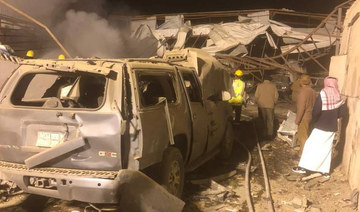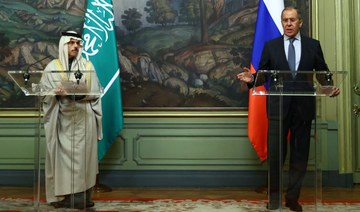NEW YORK: The UN Security Council on Monday voted to adopt a draft resolution on Yemen that expands the scope of an existing arms embargo targeting the leaders of the Houthi militia, including Abdulmalik Al-Houthi, to encompass the entire membership of the Iran-backed group.
In addition, the resolution labels the Houthis as a terrorist group for the first time, following an ongoing series of cross-border drone and missile attacks targeting the UAE and Saudi Arabia, and a wide range of violations affecting the Yemeni people and the international community.
It also renews financial sanctions and a travel ban on senior members of the Houthi militia for an additional year
Security Council Resolution 2624, which was tabled by the UAE, condemns the continuing supply of weapons and weapon components to the Houthis from outside Yemen in violation of the arms embargo established by Resolution 2216 in 2015. It urges all UN member states to step up efforts “to combat the smuggling of weapons and components via land and sea routes, to ensure implementation of the targeted arms embargo.”
Iran is accused of providing the Houthis with training and a growing arsenal of sophisticated weaponry and technology, including anti-tank guided missiles, sea mines, explosive-laden drones, ballistic and cruise missiles, unmanned maritime vehicles.
Eleven of the 15 members of the Security Council voted in favor of the resolution; Ireland, Mexico, Brazil and Norway abstained because of humanitarian concerns.
In the run-up to the vote on Monday, negotiations were especially intense around the question of whether or not the Houthis should be designated as a terrorist organization. Some members expressed concerns that this might hinder the efforts of the UN’s envoy to Yemen to broker peace, and about its possible negative effect on humanitarian operations in Yemen.
Tens of thousands of civilians have been killed by the war, which has created one of the worst humanitarian crises in the world and pushed the country to the brink of famine.
The resolution stresses that the new measures are “not intended to have adverse humanitarian consequences for the civilian population of Yemen, nor civilian access to humanitarian assistance, commercial imports or remittances.”
It also calls on states to fully comply with the principles of international law, including humanitarian law and human rights law, in the implementation of sanctions.
In addition to the ongoing cross-border attacks on the UAE and Saudi Arabia, the designation of the Houthis as a terrorist group also reflects its attacks on civilians and civilian infrastructure in Yemen; its “policy of sexual violence and repression against politically active and professional women;” its recruitment of children for warfare; its incitement to violence against religious groups; and its indiscriminate use of landmines.
“The Houthis have also obstructed the delivery of humanitarian assistance to Yemen, or access to or distribution of humanitarian assistance in Yemen,” according to the text of the resolution, which adds that sexual violence and violence against children during armed conflict are sanctionable acts that “threaten the peace, security or stability of Yemen.”
The Security Council also condemned “in the strongest terms” the growing number of attacks by the Houthis on civilian and commercial targets, and their seizure of commercial vessels in the Red Sea off the coast of Yemen. Members demanded the release of the crew of the UAE-registered merchant vessel Rwabee, who have been detained by the terrorist group since mid-January
Lana Nusseibeh, the UAE’s permanent representative to the UN, welcomed the adoption of the resolution and the addition of the entire Houthi organization to the Yemen sanctions list in response to their “flagrant violations and heinous attacks.”
It will, she said, reduce the group’s military capabilities, and help to prevent its hostile actions toward civilian vessels that threaten shipping routes and international trade.
Nusseibeh called on the Houthis to halt their terrorist, cross-border attacks and return to the negotiation table and participate in a serious political process.
“We emphasize that there is no military solution to the crisis in Yemen,” she said. “The only way to overcome the current crisis is through concerted efforts to reach a Yemen-led, Yemeni-owned political solution, under the auspices of the United Nations.”
In their explanation of the vote, council members condemned the attacks on the UAE and Saudi Arabia. Trine Heimerback, Norway’s deputy permanent representative, backed the implementation of targeted sanctions that can help to support “a path toward a political settlement and contribute to the protection of civilians.”
She added: “Joint action by the council to limit the Houthi’s capabilities to launch attacks and harm civilians is therefore welcome.”
However, she noted that the resolution fails to address Norway’s key concern about the possible negative effects it might have on the peace process and humanitarian operations in Yemen.
She said her country fears that the designation of the Houthis as a terrorist organization, “absent a clear definition (by the UN charter,) may have negative impact on UN efforts to facilitate a political solution in Yemen (and) unintended humanitarian consequences (that) could negatively impact UN efforts to address large-scale humanitarian needs in Yemen.”
Kenya’s ambassador to the UN, Martin Kimani, said his country is alarmed by “the increasing trend of transnational groups undertaking attacks outside a territory in which they are engaged in peace processes.”
He added that the Houthi attacks on the UAE and Saudi Arabia “cross over an unacceptable threshold (and) contradict this council’s effort to help the mediation of peace in Yemen.”
“It is time for the Security Council to limit such incentives for groups that have launched cross-border attacks as a way to draw attention to themselves and leverage in their national positions,” Kimani said.
“Sanctions such as these being leveled today help reinforce to those groups that they will need to cease their external attacks to have any hope of being accepted as legitimate political actors.”
The Houthis’ control over the Yemeni population and their manipulation of humanitarian aid must not be tolerated by the council, he added.
“Surely we are aware by now that attacks on civilians and civilian objects are some of the gravest drivers of humanitarian crises,” Kimani said. “Countering terrorism and supporting humanitarian action are not in conflict with one another.
“Humanitarian organizations must be enabled to better operate in the (humanitarian) space to avoid exploitation by groups. Otherwise we will be discussing the imprisonment of entire populations (as a means) to exploit the humanitarian response to their crisis.”
The Kenyan envoy also addressed the concerns among some council members about the designation of the Houthis as a terrorist organization on the grounds that such a designation is not clearly defined by the UN Charter.
“Terrorism is recognizable at the intuitive human level,” Kimani said. “An attack on an airport, such as the one we saw evidence of in the UAE, constitutes terrorism,” just as much as the 2013 shooting of dozens of civilians at a mall in Nairobi, “whether the UN has an official legal position or not” on the matter.
He called on council members to “stand together against terrorism” and added: “Let us lower the incentive for cross-border attacks by groups that we are trying to push into national stabilization and peace processes.”

























